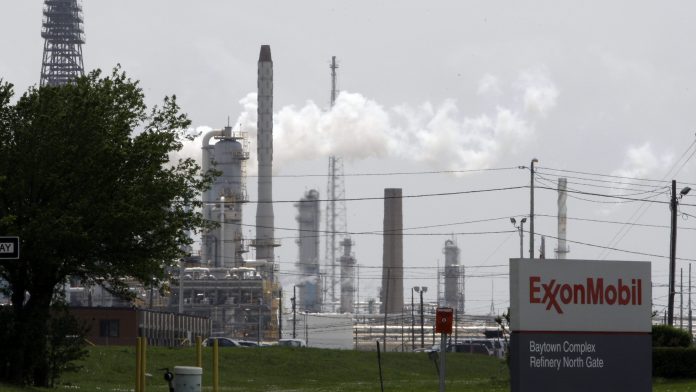The U.S. Supreme Court dealt a blow to ExxonMobil by refusing to hear an appeal to overturn a lower court decision that ordered the company to pay $14.3 million for Clean Air Act violations at its oil refinery in Baytown, Texas. The decision brings to an end the decade-and-a-half-long legal battle between ExxonMobil and some of its Baytown neighbors.
“David slays Goliath,” declared Neil Carman, clean air director for the Lone Star chapter of the Sierra Club, in reaction to the court’s decision.
The case, Environment Texas Citizen Lobby, Sierra Club v. ExxonMobil, resulted in the largest penalty ever imposed by a court in a citizen-initiated lawsuit to enforce environmental laws. In rejecting the appeal, the court refused to reconsider the underlying precedent that says when state and federal agencies have not adequately enforced environmental law, private citizens can take legal action against companies that have committed violations that led to proven harm.
The case has become a rallying point for environmental organizations. ExxonMobil, on the other hand, had already filed and lost four appeals since the case initially went to trial in 2014.
Why was ExxonMobil sued?
About 25 miles east of downtown Houston, the ExxonMobil Baytown complex takes up 3,400 acres where the company has an oil refinery, chemical plant and advanced recycling facility. The oil refinery takes crude oil and processes it into a usable fuel, producing about 588,000 barrels a day. The Baytown complex is among the largest petrochemical facilities in the nation in both size and production.
The case started when Environment Texas, an Austin-based nonprofit, combed through emissions data and found excessive pollution based on information ExxonMobil reported to state and federal regulators. The organization found thousands of instances in which ExxonMobil exceeded the legal limits on air pollution specified in the Baytown refinery’s permits under the Clean Air Act.
After discovering air permit violations, Environment Texas and the Sierra Club found Baytown residents to testify about how pollution impacted their health and livelihoods. ExxonMobil’s final appeal was heard before a full panel of 17 judges at the 5th U.S. Circuit Court of Appeals, which issued its decision in December 2024. In the end, the court agreed that ExxonMobil committed 16,386 violations of its air permits between 2005 and 2013 and affirmed a lower court’s $14.3 million penalty, which is paid to the Environmental Protection Agency (EPA).
In total, the court found the refinery emitted 10 million pounds of unauthorized pollution, 90% of which consisted of chemicals that the EPA has said can endanger public health, such as benzene and volatile organic compounds.
What does the decision mean for private citizens’ ‘standing?’
In its appeal to the U.S. Supreme Court, ExxonMobil asked the court to reconsider a 25-year-old precedent, Friends of the Earth v. Laidlaw Environmental Services, which allows private citizens to file lawsuits under the Clean Air Act. That precedent held that civil penalties can redress injuries citizen plaintiffs have suffered by deterring future violations.
The court’s refusal to hear the case preserves what attorneys call “constitutional standing” for neighbors to enforce environmental laws when government agencies won’t act. The Texas Commission on Environmental Quality fined ExxonMobil over $1.3 million for only 36 air permit violations committed from 2005 to 2013, the Houston Landing has reported.
David Nicholas, a lead attorney for the environmental groups, said rejecting the appeal “confirms that Constitutional standing for neighbors enforcing federal environmental laws is alive and well.”
What is the reaction?
A spokesperson for ExxonMobil did not respond to a request for comment at the time of publication. After the lawsuit was filed in 2010, ExxonMobil attempted to address the pollution. According to a dissenting opinion at the 5th Circuit Court, the company invested $6 billion in maintenance and equipment to better control emissions, resulting in a 95% reduction in unauthorized pollution from 2006 to 2013.
ExxonMobil is the largest employer in Baytown, a major petrochemical hub that is also home to a Chevron Phillips chemical plant. Numerous other refineries and petrochemical processing facilities are located nearby on the Houston Ship Channel, where companies can easily import raw materials and export products.
Former Baytown resident Sharon Sprayberry testified against ExxonMobil at trial. In a statement to Straight Arrow News, Sprayberry described the 15-year saga as a “long and difficult pursuit of justice,” and said fights over clean air are more important now than ever.
Sprayberry grew up in Baytown and developed asthma at a young age. Her asthma subsided when she left for college, but it came roaring back when a career opportunity enticed her to move back to Baytown as an adult.
“I am celebrating our team’s victory,” said Sprayberry, who has since relocated to Waco, Texas, due in part to concerns about her health. “But make no mistake, the work is really never over when people are struggling to breathe.”

